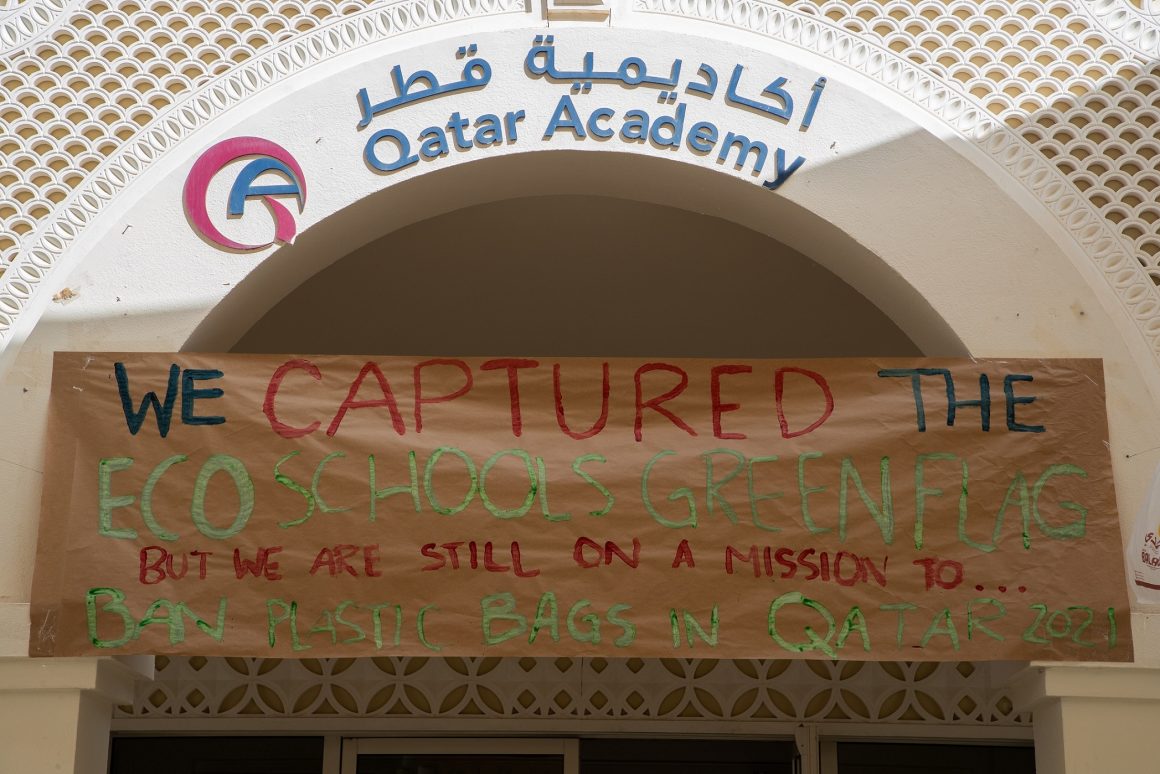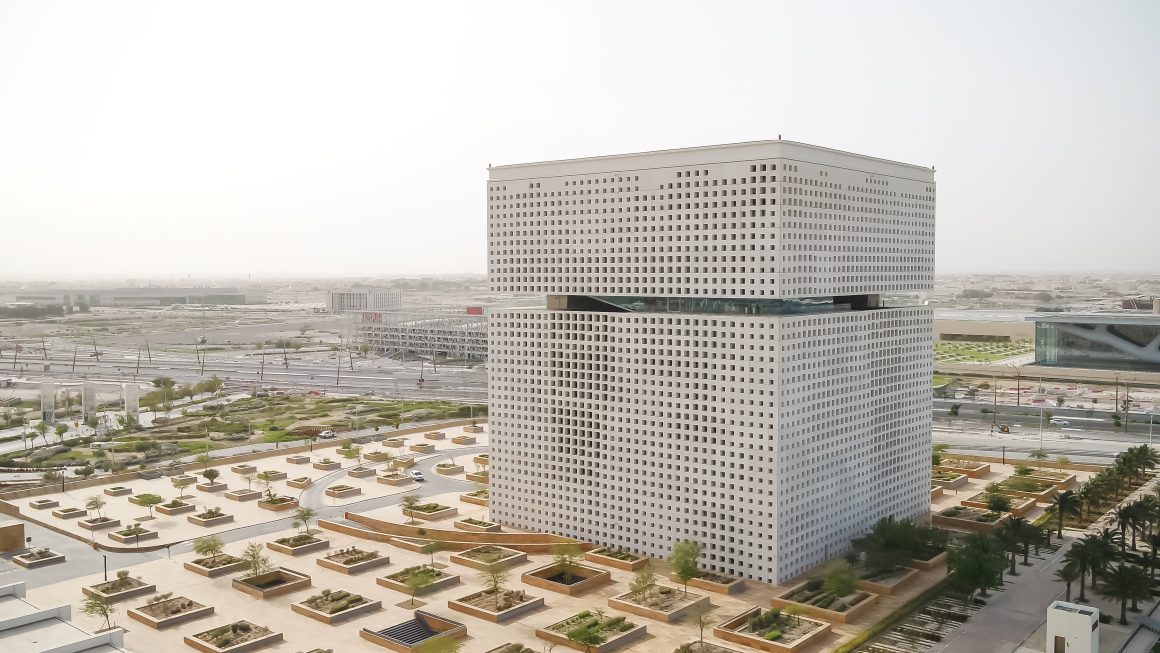
Education City Stadium is a leading example in green buildings and the first FIFA World Cup Qatar 2022 venue to receive the five-star GSAS certification from GORD.
Activism breeds in a fertile land when built on grounds willing and accepting of change; and change is often associated with youth – their curiosity and drive for leadership.
It took only 45 young voices to jet-start one policy in motion: banning single-use plastic bags in Qatar.
This call reverberated through the hallways of Qatar Academy Doha (QAD), as the students joined the global advocacy campaigns in taking sustainable action towards curbing environmental threats and spreading awareness.
Through the Activists in Action programme which was launched in 2020, amassing the support of 130 students representing the student leadership at QAD, they covered the walls and floors of the school with plastic bags and bottles collected by students, parents and teachers to shed light on the amount of plastic waste consumed by society.
“I decided to join this initiative in grade four when we were assigned to write a speech about global warming. During this period I researched about the many causes that affect our environment,” Khalid Al Shaibei, currently a grade eight student at QAD told Doha News.
Upon realising the importance of climate change and sustainability promotion, Khalid said: “I realised I want to commit to securing a better future for myself and future generations and that is when I decided to join the ban on single use plastic initiative.”
“I decided to join Activists in Action and become a leader in [promoting] sustainability.”
WATCH: Qatar’s amir responds to young climate activists urging ban on single-use plastic
Wanting to lead a better future for his generation, Khalid believes in the key role of sustainability activism and power in spreading the message beyond the bounds of his school.
“Our effect on the community has already started to show with the recent ministerial order that, starting from 15 November, single use plastic bags will be banned from the retail industry in Qatar,” Khalid said.
Young hope for a greener Qatar
In late June, the Ministry of Municipality announced the executive decision to ban the use of single-use plastic bags as of 15 November in all institutions, companies and shopping centres.
When Khalid speaks of hope, he wishes for a greener tomorrow for Qatar, believing that his hometown is on the right path to achieving a more sustainable future. “I hope to see that continuing on further than just single-use plastic cars but a greener environment overall for a safer and greener future for Qatar.”
The students involved had pledged to collect as many names as 10,000 in a petition to be presented before the government, in a bid to urge the country to join the global effort to reduce single-use plastic waste.
Ghalia Al Darwish, currently in grade five at QAD, has been a part of the Activists in Action team since second grade, where she first became aware of her responsibility towards “saving” the environment.
“The group Activist in Action gave me the opportunity to fulfil my duty and purpose to work towards making Qatar clean and ban single-use bags and spread awareness,” Ghalia told Doha News.

Sustainability activism has been cultivated for many students at QAD at a young age with students like Ghalia carrying on the message even outside her school.
Starting at such an early stage in life, Ghalia participated in beach cleaning as well as in a podcast episode to further spread green awareness.
Harbouring the leader within her, Ghalia went to multiple locations such as Msheireb, Qatar Foundation, and other campaigns to reach a wider audience during environment day and “even during the FIFA football games we were around the football club explaining our cause and why everyone should join and take action,” she told Doha News.
Speaking about the recent governmental developments on banning single-use plastic bags, Ghalia said: “It wasn’t easy to get everyone’s attention but the ones who did were really helpful and understanding. I’d like to thank everyone who signed the petition and made this happen. It felt special, empowering and a great achievement to cause the change and for our voices to be heard.”
Government recognition
Last year, the Amir Sheikh Tamim bin Hamad Al Thani sent a personal letter to the student-led group expressing his appreciation for the young activists in uniting their voices for concerns on environmental issues.
“Dear Qatar Academy-Doha students, I followed the campaign that you launched during the past year aimed at reducing the use of single-use plastic bags. I would like to express to you my thanks and appreciation for this important initiative, wishing you all the success,” the amir’s letter read.
“This encourages us to carry on,” Ghalia said.
Going plastic-free will allow our planet a chance to breathe
The QAD-nurtured Activist in Action cemented the notion of change in the students involved, with Ghalia transforming her outlook “on day to day activities like transportation and shopping consumption.”
Another such activist is 11-year-old Sara Al Dosari who was inspired by her older sister, one of the founding members of Activist in Action.
Detailing other reasons behind wanting to join the team, Sara told Doha News that she wanted to push for a cleaner environment where safety becomes inevitable “even if people come [to Qatar] from outside the country, we want to always make them feel safe.”
Carrying on her call for a ban on single-use plastic bags, Sara said “it’s a really important message.”
“No matter how old you are, you still need to know everything about keeping your environment clean”.
Qatar Foundation’s green efforts
Qatar Foundation leads other such sustainability efforts such as hosting one of Qatar’s eco-school, QAD, and the EcoCampus programme through the Earthna member organisation.
Launched in March 2022, Qatar Foundation-born green project Earthna is a non-profit policy research and advocacy centre, focusing on informing and influencing national and global sustainability policy. Amongst other initiatives, Eco-schools – the largest global sustainable schools programme as per the Foundation of Environmental Education (FEE) – now operate as legacy programmes within the green organisation.
“The creation of Earthna Centre for a Sustainable Future is at the heart of this vision to both focus and address sustainability priorities in Qatar, and to be part of a collaborative effort to enhance climate action and innovation in Qatar,” Nihal Mohamed Al Saleh, programme manager at Earthna told Doha News.
Earthna’s predecessor, the Qatar Green Building Council, was one such entity to adopt environmental and building accreditation in Qatar early on, creating various initiatives and accreditation schemes for the eco schools as well as the hospitality sector.
“As a proud Eco-Schools member, we aim to cultivate a sustainable mindset in all our students,” Elizabeth Kennedy, Primary School Assistant Principal at QAD, told Doha News.
Eco-schools and Qatar Foundation Pre-University have “inspired and supported our school community to nurture youth activism,” she added.
Teachers at QAD have cultivated the culture of sustainability into the school’s curriculum and “class conversations as a key component of [the] school practices and values.”
“The Eco-school programme provides our children with sustainability education through a unique ‘real-world’ experience, which makes it very valuable. When they understand the results of environmental policies, at a school level, and at that young age, they will grow up to be effective members of a community that protects the environment,” Dr Soud Al Thani, Director of Climate Change and Carbon Management at Qatar Foundation told Doha News.
“It is my hope that the programme circulates as many schools in Qatar as possible so that engrains in younger generations the values of sustainability.”
Another exemplary green effort at Qatar Foundation was acknowledged with the Qatar Foundation headquarters, the 2015 building at Education City, being awarded the Global Sustainability Assessment System (GSAS) Operations Certificate from the Gulf Organisation for Research & Development (GORD) for proving that a building could also operate in an environmentally-friendly manner.
Pointing out Qatar Foundation’s ongoing green efforts, Dr Soud Al Thani said: “We have an ongoing carbon accounting programme that details greenhouse gas emissions from various activities that take place in Education City.
The information collected is regularly analysed to examine opportunities of optimisation in areas of transportation, facilities management or any other operation. We continually strive to enhance the programme and elevate our environmental sustainability goals.”

The Education City Stadium is also a leading example in green buildings. It was the first FIFA World Cup Qatar 2022 venue to receive the five-star GSAS certification from the GORD.
On a national level, Qatar Foundation coordinates closely with their relevant public and private sector partners.
“With the aid of QF institutions like Hamad Bin Khalifa University, Qatar Environment & Energy Research Institute and Earthna, the Ministry of Environment and Climate Change leads efforts formulating policies that collectively drive Qatar towards the larger sustainability goals,” Dr Soud Al Thani said.
“On the governance side of sustainability, aligning our organisational strategy to embed sustainability across everything we do, from our tenders to our procurement methods, to the content of our programmes to our logistics and synergies across the organisation, there is much to be celebrated and a lot that we are improving on daily,” Al Saleh noted.
Hand in hand, the different programmes at Qatar Foundation offer a variation in the green palette, each stemming from different angles towards one goal: fostering a greener Qatar.
Related Posts


